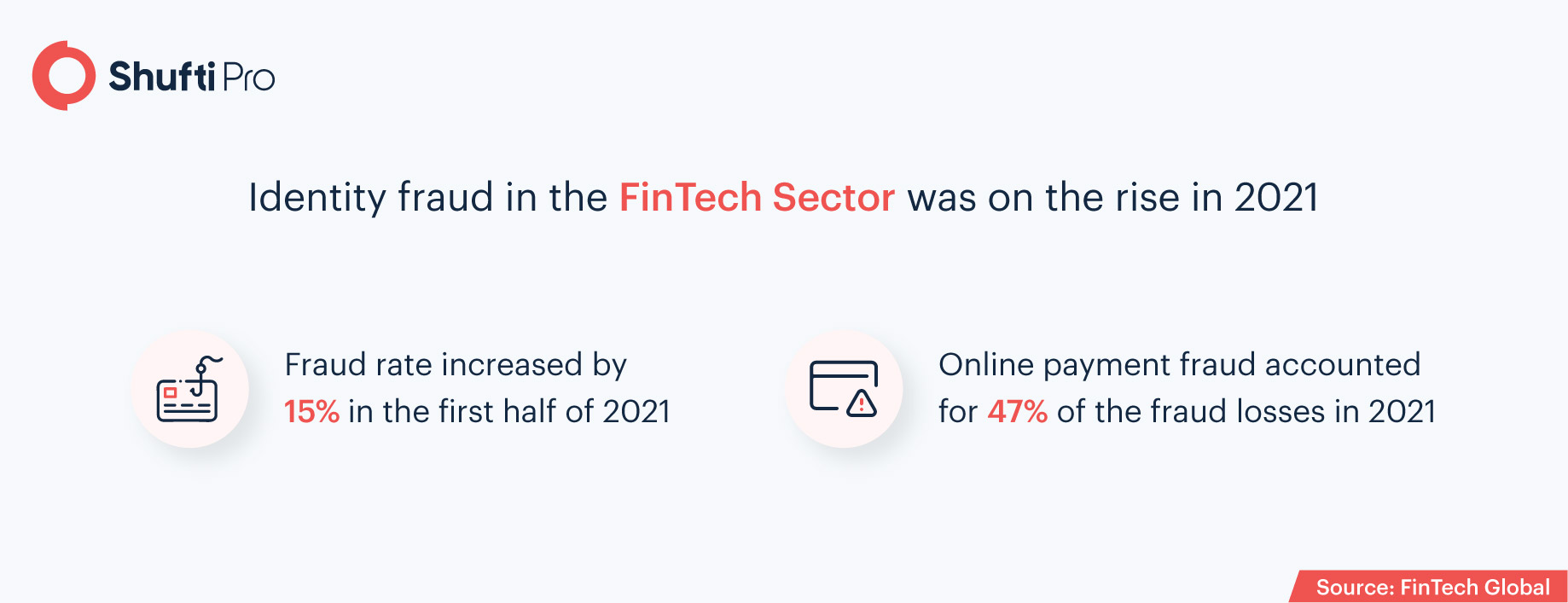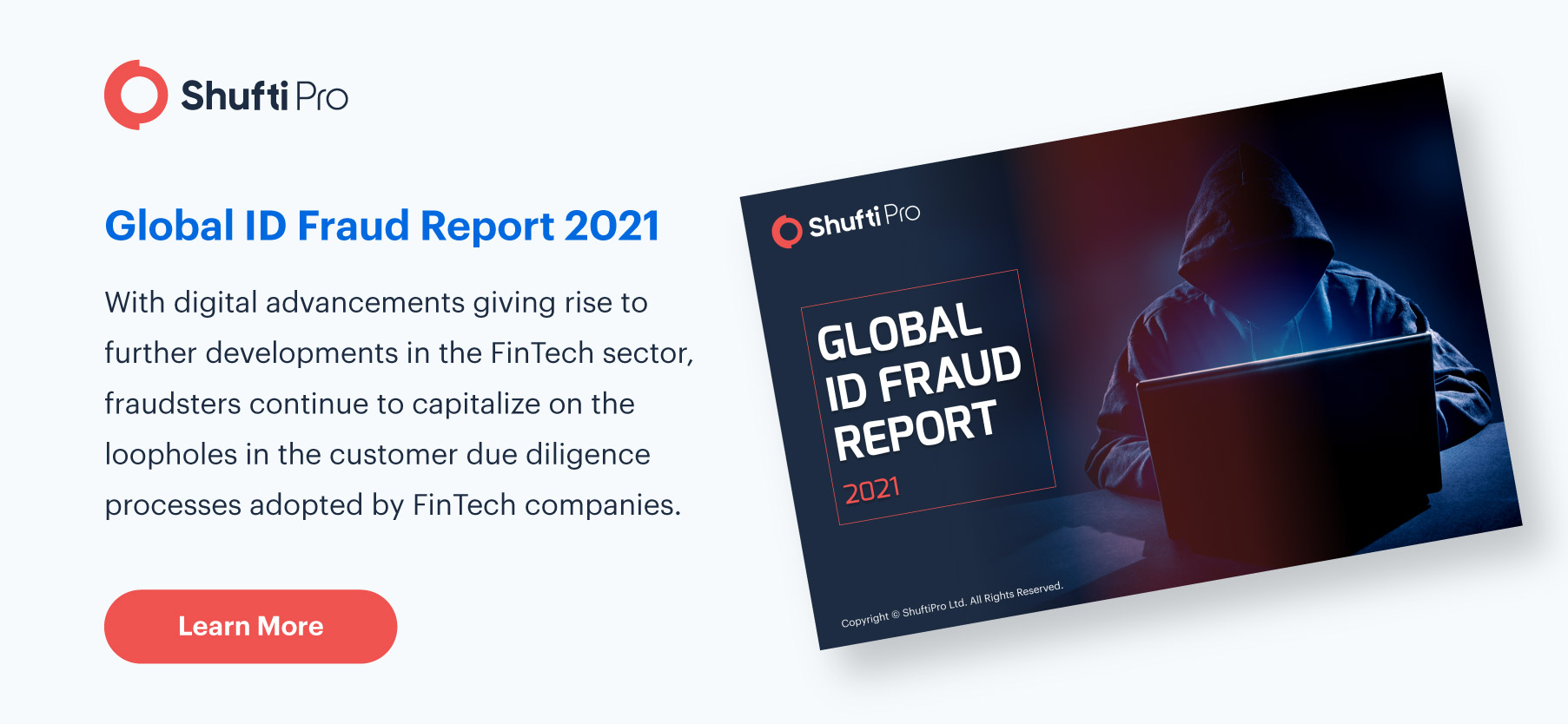The Relentless Rise of Fraud in the FinTech Industry – How CDD Helps

Fraud has always been on the rise ever since the advent of the FinTech industry. As perpetrators continue to develop new techniques to breach digital financial systems, identity theft and money laundering cases keep on increasing. Crimes can be as simple as stealing someone’s identity and as complex as manipulating online transactions to siphon off funds.
In 2021, the FinTech industry saw a 15% increase in the rate of identity fraud. Not only that, FinTech was the second most adversely affected industry after the health sector in terms of fraud. The bad news for the US came in the form of N26, one of the most successful neobanks, halting their operations in the country.
Effects of Fraud on FinTech in 2021
With FinTech services gaining prominence after the Covid pandemic, more and more businesses adopted tech solutions to accommodate their customers in the best ways possible. While this mass adoption of FinTech provided ease of access to customers, it also gave way to a variety of new ways to commit financial crimes. In 2021, there were more fraud cases on average as compared to 2021, and the trend hasn’t changed this year. While the US saw good and bad days in terms of fraud rates, the EU’s graph was relatively stable.
As per statistics, identity theft was the most common type of fraud in FinTech.
The growing issue has become so serious that some FinTech companies, including digital banks HMBradley and One, as well as investment companies like Betterment have impermanently banned transfers from digital banks just because they fear getting involved in financial crime. Institutions throughout the finance sector that are operating through digital platforms are facing issues with fraud. Neobanks, a type of FinTech service, are repeatedly facing regulatory pressure for weak KYC/AML compliance measures.
Neobanks
Neobanks have experienced the advantages arising from the rise in Banking-as-a-Service (BAAS), which enables them to make the most of legacy banks’ licenses, standards, regulations, and payment networks. These perks have also opened doors for new market players to launch their products and services while staying at par with traditional banks. As a result, newly opened banks do not have to prove the authenticity and quality of services for every organization and customer to use and accept their credit cards.
However, this ‘advantage’ itself has a significant number of loopholes. The fast-paced growth of the FinTech industry in the past few years has led numerous startups to become major players. This has created ever-increasing opportunities for financial crime, as well as challenges in terms of financial access and equity.
In the US, Neobanks have dominated the market in a very short span of time. For instance, over 120 million customers were added to PayPal in just the last two years, bringing the total up to 426 million. The major player made use of innovative customer-attracting tactics like cash rewards for registering on an online platform. However, all that success did not go unnoticed by fraudsters. The company identified over 4.5 million “illegitimately created” accounts, forcing them to report the fraud issue in FinTech.

Robinhood Bans Fund Transfers
Robinhood, which is a prominent free stock trading platform with a traffic of 22 million users, recently became the next FinTech in line to impose a ban on funds transfers from a specified list of financial institutions. The stock trading app chose not to disclose the list, but a wide array of neobanks, moderate-size banks, and a smaller number of large-scale banks are included in it. The fraud prevention technique was used as a blunt tool by the FinTech name.
In a statement to Forbes, a spokesperson confirmed: “Robinhood prevents transfers from routing numbers that display a high pattern of return and fraud rates.” Here, routing numbers include bank identification numbers that are used in the US for bank-to-bank transfers. “It is a standard practice to prevent transfers from institutions that are sources of sustained levels of fraudulent activity, whether digital banks or traditional banks,” the statement continues. “When Robinhood and other financial institutions take the step to prevent transfers from a particular routing number, it’s because the fraud problem originates at that institution.”
Chime Indirectly Affected by Fraud
According to the Wall Street Journal, the biggest name among US neobanks, Chime, is approached by thousands of new customers every month. Its customer bank nearly doubled from 7 million to more than 13 million by the end of 2021. Although Chime itself wasn’t directly subject to any known fraud cases, some of the industries that use its services are being affected. Rental car services that experienced fraud while using Chime cards have begun to impose banks on their usage.
One such rental car company, Avis, sent out a tweet in 2021 about declining payments made through Chime cards due to numerous fraud reports. Not only Avis but other prominent names in car rental businesses, like Enterprise and Hertz, have also imposed bans on Chime cards.
FinTechs in Europe
Digital banks become a target for fraudsters when they offer services like prizes upon sign-up. Fraudsters tend to capitalize on the lack of identity verification and FinTechs’ need to ensure seamless banking experiences to carry out their illicit activities. Neobanks and FinTechs in Europe have also reported numerous fraud concerns over the years. The financial service providers have claimed that fraudsters have exploited their services for illegal financial crimes ranging from fake identities to fraudulent transactions.
For instance, the dominant German Neobank, N26, was fined by financial watchdogs for weaknesses in its anti-money laundering measures. Another FinTech called Monzo is currently being investigated for the same reason. In 2019, the Financial Conduct Authority stated that the FinTech company named Revolut had AML compliance systems that were “utterly inadequate”. This resulted in the company losing quite a lot of staff members, including two of the major compliance department members who left instantly in 2020.
The variations in fraudulent activities faced by FinTech companies are largely dependent on the type of financial services they offer. Speaking of customer-centric FinTech companies that provide lending services, the most common type of fraud is synthetic identity fraud. Whereas, the FinTech companies that provide checking and savings account services face identity theft as a whole.
What Shufti Offers
With fraudsters becoming ever so sophisticated in breaching online financial service platforms, the need for top-notch identity verification cannot be stressed enough. To help FinTech companies secure their customers’ identities and funds, Shufti offers a robust identity verification solution that detects fake identities with an accuracy of 98.67% in less than a second.
Moreover, Shufti’s AML Screening solution secures FinTech transactions by searching through 1700+ global watchlists and PEP lists.
Want to learn more about Know Your Customer (KYC) for the FinTech industry?












